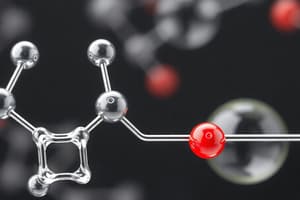Podcast
Questions and Answers
Which type of compounds typically react faster due to their bonding?
Which type of compounds typically react faster due to their bonding?
- Metallic Compounds
- Ionic Compounds (correct)
- Covalent Compounds
- Organic Compounds
Ionic compounds require more energy to break their bonds compared to covalent compounds.
Ionic compounds require more energy to break their bonds compared to covalent compounds.
False (B)
What effect does increasing the surface area of solid reactants have on the rate of reaction?
What effect does increasing the surface area of solid reactants have on the rate of reaction?
It increases the rate of reaction.
Covalent compounds react _____ compared to ionic compounds due to the need for energy to break their bonds.
Covalent compounds react _____ compared to ionic compounds due to the need for energy to break their bonds.
Match the type of compound with its reaction speed:
Match the type of compound with its reaction speed:
What happens to the rate of reaction as the concentration of reactants increases?
What happens to the rate of reaction as the concentration of reactants increases?
The equilibrium constant (Kc) is dependent on the concentrations of reactants and products.
The equilibrium constant (Kc) is dependent on the concentrations of reactants and products.
What is the relationship defined by the Law of Mass Action concerning the rate of a chemical reaction?
What is the relationship defined by the Law of Mass Action concerning the rate of a chemical reaction?
At equilibrium, the rate of the forward reaction, $r_1$, is equal to the rate of the _____ reaction, $r_2$.
At equilibrium, the rate of the forward reaction, $r_1$, is equal to the rate of the _____ reaction, $r_2$.
Match the following variables with their corresponding meanings in the context of the equilibrium constant equation:
Match the following variables with their corresponding meanings in the context of the equilibrium constant equation:
What is the value of $K_c$ that favors the formation of products?
What is the value of $K_c$ that favors the formation of products?
Solids are included in the expressions for calculating equilibrium constants.
Solids are included in the expressions for calculating equilibrium constants.
What does a reversible reaction allow?
What does a reversible reaction allow?
In the equation $AgCl(s)
ightleftharpoons Ag^{+}(aq) + Cl^{-}(aq)$, AgCl is a __________.
In the equation $AgCl(s) ightleftharpoons Ag^{+}(aq) + Cl^{-}(aq)$, AgCl is a __________.
If the stoichiometric coefficients of a balanced chemical equation are doubled, how does this affect the equilibrium constant?
If the stoichiometric coefficients of a balanced chemical equation are doubled, how does this affect the equilibrium constant?
Increase in concentration of reactants will favor the formation of products.
Increase in concentration of reactants will favor the formation of products.
What is the general expression for the equilibrium constant $K_c$?
What is the general expression for the equilibrium constant $K_c$?
Match the following reactions with their equilibrium constants:
Match the following reactions with their equilibrium constants:
Flashcards
Ionic vs. Covalent Reaction Speed
Ionic vs. Covalent Reaction Speed
Ionic compound reactions are typically faster than covalent compound reactions because ionic compounds are composed of charged particles that react immediately when mixed, while covalent compounds require breaking bonds, which takes time.
Surface Area Effect
Surface Area Effect
Increasing the surface area of a solid reactant increases the reaction rate by increasing the number of collisions between reactants.
Reaction Rate & Collisions
Reaction Rate & Collisions
The rate of a reaction depends on the frequency of collisions between reactant particles.
Ionic Compound Reaction
Ionic Compound Reaction
Signup and view all the flashcards
Covalent Compound Reaction
Covalent Compound Reaction
Signup and view all the flashcards
Equilibrium Constant ($K_c$)
Equilibrium Constant ($K_c$)
Signup and view all the flashcards
What does $K_c > 1$ mean?
What does $K_c > 1$ mean?
Signup and view all the flashcards
What does $K_c < 1$ mean?
What does $K_c < 1$ mean?
Signup and view all the flashcards
Solids in Equilibrium Constant
Solids in Equilibrium Constant
Signup and view all the flashcards
Effect of Stoichiometry on $K_c$
Effect of Stoichiometry on $K_c$
Signup and view all the flashcards
Reversible Reaction
Reversible Reaction
Signup and view all the flashcards
Complete Reaction
Complete Reaction
Signup and view all the flashcards
Ionization of Sparingly Soluble Salts
Ionization of Sparingly Soluble Salts
Signup and view all the flashcards
Collision Theory
Collision Theory
Signup and view all the flashcards
Concentration & Reaction Rate
Concentration & Reaction Rate
Signup and view all the flashcards
Law of Mass Action
Law of Mass Action
Signup and view all the flashcards
Kc Calculation
Kc Calculation
Signup and view all the flashcards
Study Notes
Nature of Reactants
-
Type of bonding in the reactants:
- Ionic compounds react because the reaction takes place between ions. Those ions are ionized as soon as mixed.
- Covalent compounds react because the reaction takes place between molecules. An amount of energy is consumed to break the covalent bonds.
-
Surface area of reactants:
- Increasing surface area (e.g., powder form) increases the chance of collisions, thus increasing the rate of reaction.
Studying That Suits You
Use AI to generate personalized quizzes and flashcards to suit your learning preferences.




